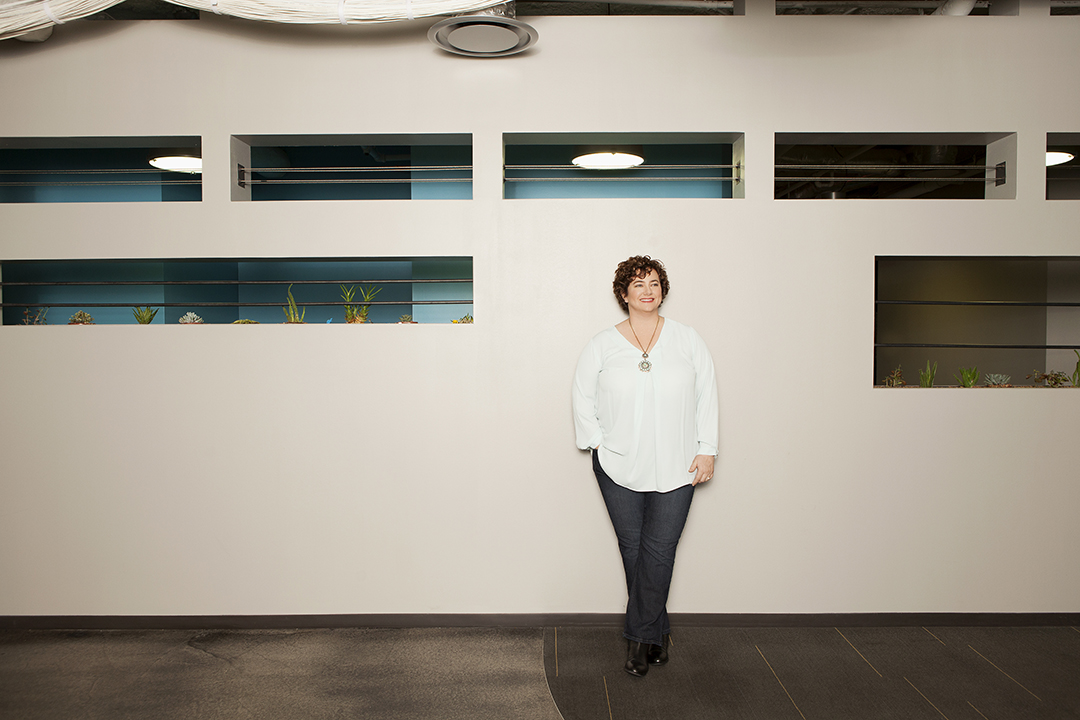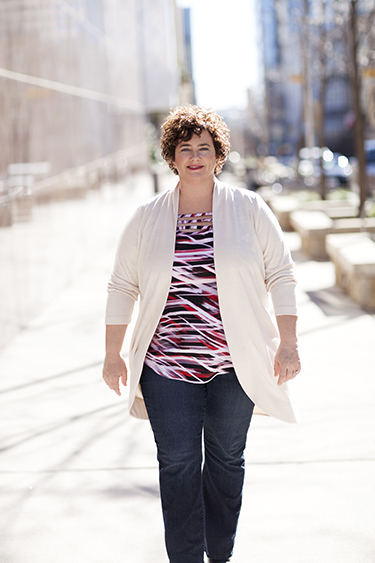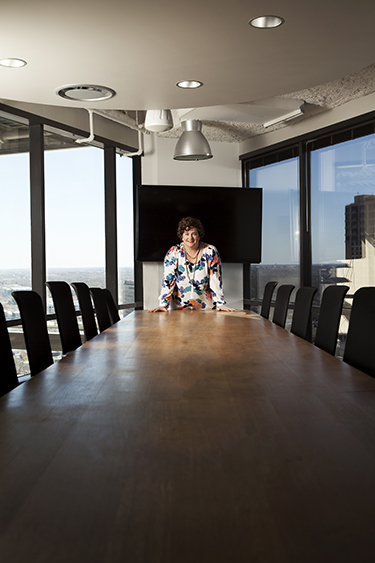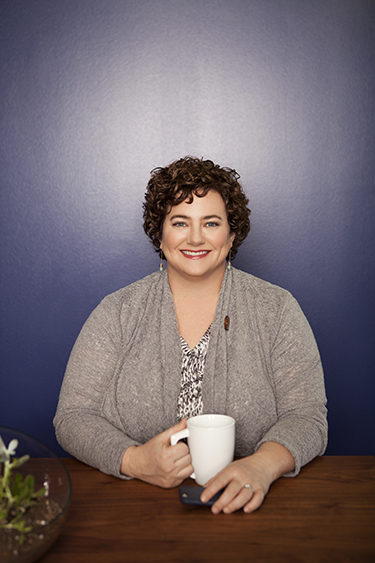Austin’s accidental entrepreneur Mellie Price shares her journey to success and her advice for other aspiring entrepreneurs.
 In outward appearance, Price doesn’t fit the stereotypical image of a crisply attired business sharpie. Preferring earth-toned casual wear versus power suits and designer dresses, she exudes an air of nonchalant ease and affable approachability. Her face, adorned with a virtual bouquet of curls that frames her features in a russet-hued halo, is warm and welcoming. Her fiercely high-definition blue eyes—the first thing anyone notices upon meeting her—command attention, even in repose.
In outward appearance, Price doesn’t fit the stereotypical image of a crisply attired business sharpie. Preferring earth-toned casual wear versus power suits and designer dresses, she exudes an air of nonchalant ease and affable approachability. Her face, adorned with a virtual bouquet of curls that frames her features in a russet-hued halo, is warm and welcoming. Her fiercely high-definition blue eyes—the first thing anyone notices upon meeting her—command attention, even in repose.
Then there’s the matter of that distinctively buoyant name, Mellie.
“My given name is Melinda,” she explains. “I was Mindy when I was growing up, and I’m still Mindy to my parents. Somewhere in middle school, I didn’t want to be called Mindy anymore, so I went back to Melinda. Then around high school, a friend who’s an artist said, ‘Melinda’s so serious. I’m going to call you Mellie.’ When we both moved to Austin to go to UT, we made new friends and they all knew me as Mellie.”
She smiles with the contentment of a longtime wanderer who’s found a home.
“I’ve always been Mellie here,” she says. An old adage says it’s not the destination that counts, but the journey. Price may uproot that axiom by proving it’s not so much the journey, but improving the road on which you take it. Or, better yet, building a whole new road.

Price’s own journey began nearly 1,000 miles north of her current home in Austin. As the younger of two siblings, she was raised amid the mountains and trees of Colorado, the daughter of a mining engineer and businessman father and a stay-at-home mother.
“My mom is an artistic, spirited, life-loving person, and my dad is this methodical engineer who worked in heavy equipment all his life. I’m the perfect complement of both my parents,” she says.
As a child, Price was equal parts outgoing tomboy and precocious science geek.
“I was always sort of meandering between the physical things like tennis and racing BMX bikes, creative things like photography and the academic side of math and science. I’ve always had to have that balance in my life, which I think ties into my story of entrepreneurship,” Price says.
When she was 12, her family moved to Irving, Texas.
Moving to Austin to attend the University of Texas, Price was drawn to marine biology, but found the nature of the work repetitive and constraining. “I wanted to study medicine, but I did not want to be a doctor,” she says.
“I wanted to study aquatic beings, but I didn’t want to work in an aquarium.”
While attending classes, she also worked for the Texas Forestry Service, analyzing tree samples in a lab.
“I loved the research and science of it,” she admits. “I did not like standing in a lab for 10 hours a day whittling sticks.”
Restless to relieve herself from the monotony of lab work, Price found an outlet for her energy in music, and Austin provided an ideal playing field.
“I played bass in several bands, mostly indie and alternative. Back then, it was like Indigo Girls, Melissa Etheridge,” she says. “We certainly weren’t good enough to tour!”
Price’s early music connections would prove handy later.
“I was at that pivotal point where I hadn’t picked a path yet,” she recalls. “I was teaching myself computers, which were not ubiquitous at that point. I was learning to program as a means to help pay for school.”
Her self-taught skills began attracting attention. While at UT, Price found herself in demand from peers for her intuitive computer expertise, particularly consolidating and storing data.
“All of a sudden, people were saying, ‘Hey, can you do this?’ Then this thing called the Internet starts bubbling around, and I taught myself to be a system administrator,” she says.
Price began accruing a tidy profit with her side business.
“I bought my first CD-ROM printer—I think it was $5,000 or something absurd—and started charging people $100 a disc to burn their data onto a permanent CD,” she says. Business took off, and she paid off the printer within two months. She had almost inadvertently manifested a lucrative vocation for herself.
“I was like, ‘Oh, this works!’ I made $40,000 [or] $50,000 burning CD-ROMs for people,” she says.
After graduating from UT with a bachelor’s degree in biology, Price began focusing on her rapidly expanding business, acquiring new skills like bookkeeping, data entry, managing business inputs and accounting. She began building websites, modest and rudimentary at first, incrementally expanding in scope, design and functionality. She christened her new company Monsterbit, and immediately set about procuring clients. Price’s ebullient personality and unwavering persistence served her well.
“I went and begged people to build websites because nobody knew what they were,” Price says. She soon found herself with a growing reputation for building an effective online presence for a diverse array of businesses, organizations and people: artists, musicians, designers, magazines with low circulations. Not surprisingly, the budding web guru found herself particularly drawn to the music industry.
“I’d go in and say, ‘There’s this thing called the Internet, and it’s going to be really big. Can I have a crack at doing your first website?’ ” she remembers.
One of her early successes was constructing the website for Daemon Records, the Georgia-based indie label created by Amy Ray of the Indigo Girls. Today, Ray can’t quite recall the details of how they met, but she vividly remembers the effects of Price’s impact on her company.
“She came in with a lot of great ideas about how to move us into the modern age,” Ray recalls. “I was a bit of a Luddite, and Mellie already had a grasp on the importance of what was happening out there in the Internet and why Daemon needed to be promoting its music in a more forward-thinking way. The label would come up with stuff we wanted to achieve, usually ignorant of the ingredients needed in the recipe, and she would just make it happen, like folks I know in Cuba that could use the craziest things to fix things and make them work. She was very creative like that, a MacGyver in the world of music and club promotion. She’s in it for the right reasons, I think, and really into the sheer joy of solving problems and being inventive. She’s charming, enthusiastic, generous and wicked smart.”
Price built dozens of websites for local venues like Stubb’s, The Backyard, La Zona Rosa, as well as for various artists, nonprofit organizations and political causes. In those days, Austin was at a crest of technology innovation, and Price was riding the wave with profitable aplomb, creating the first website for SXSW and managing it for five years. She also built and served as Internet editor for one of the first Internetbased indie-music magazines, Pop Culture Press, spawning an entire new generation of online music e-zines.
In the midst of her meteoric professional rise, Price had a significant self-realization as well.
“I’d just graduated, and by that point in time, I knew I was gay,” she says.
The issue wasn’t the proverbial elephant in the room. It simply was what it was, not so much an epiphany as a gradual recognition.
“When I told my parents, I didn’t know how they’d receive it,” she reflects. “The irony is that I thought my mom, who’s sort of artistic, would be like, ‘Oh, honey, I’m so happy for you!’ and that my dad, who’s the hard, engineering, black-and-white kind of mentality, would be really upset. But initially when I told them, my mom was the one who was most uncomfortable, and my dad was the one who seemed sort of secretly relieved that I wasn’t going to get pregnant and marry too early.
“Being gay is the same thing anybody else goes through: ‘Oh, the relationship’s almost right but not quite right.’ ‘Did I stay too long?’ ‘Did I leave too early?’ ‘Did I handle it well?’ But you know when you know. That’s how my relationships have been, and that’s how business has been for me. I know when I’m onto a good idea as an entrepreneur. It’s visceral, you know. My intuition has been very good to me.”
By 1997, Monsterbit had grown from a one-woman band to a staff of seven, and was partially acquired by outside software company Human Code. Price went on to become senior vice president at Human Code, which was subsequently acquired by Sapient Corporation three years later. Price accepted a job at Sapient handling business-to-business web development, but, ever restless, found the experience unfulfilling, leaving in 2001.
For the first time, Price found herself adrift and at loose ends. And things were about to get worse.
“I’d just sold my company. I was making buckets of money for a 31-year-old. The Internet was booming. Suddenly, my 37-year-old brother, my only sibling, died of a heart attack. My relationship ended. The market began to fumble. I had disengaged from my family because I was gay. It was a perfect storm of personal change, and the first real moment of self-awareness in my life. I’d done what I was supposed to do. I was moderately successful. But there was a sort of,” she pauses a moment, staring into her wineglass, trying to cherry-pick an appropriate word, “emptiness to that life. When my brother died, that sort of put a wrapper around everything. I didn’t know where to go. I was kind of in a rabbit hole. It was definitely dark times.”
Though Price was in a personal tailspin, her professional profile still had a five-star rating.
“I had a good culmination of skills,” she says. “I had enough technical ability and aptitude in programming skills that I’d distinguished myself as able to take on diverse projects, and built relationships in the creative industry, from design firms to music venues and artists and all that.”
With fortuitous timing, a friend in management at Stubb’s Bar-B-Q called her, posing exactly the kind of challenge Price found irresistible. The popular restaurant-cum-music venue was having problems with its ticketing company. Its patrons were complaining, and the owners were desperately seeking a solution. At that time, there was pretty much only one ticketing company in town, and its reputation was less than scrupulous. Price proposed a typically visionary and audacious idea: Why not build a whole new ticketing platform and paradigm that would cater to clients’ specific needs and venues? After nearly a year of stealth research, development and working under the radar, Front Gate Tickets was officially launched in 2003, with Stubb’s becoming its first client.
Venue by venue, region by region, Front Gate began acquiring an impressive roster of notable venues and clients nationwide, building a formidable alternative to Ticketmaster’s monopoly. Once again, Price found herself an accidental entrepreneur, and Front Gate Tickets became, literally and figuratively, the hottest ticket in the business. Within a year, Front Gate landed its largest client yet, becoming a strategic partner with C3 Presents. Front Gate took on the gargantuan task of ticket sales for such iconic events as ACL Fest and Lollapalooza. In 2011, the system generated more than $70 million in ticket sales in more than 800 cities throughout North America. In 2012, Price sold Front Gate to Live Nation.
In spring 2007, Price met Josh Baer, an Austin-based up-andcoming entrepreneur with an intuitive knack for successful startups. Baer had previously co-founded several prosperous companies, including Buzzmgr, UnsubCentral and Sky List, and had already developed a reputation as an “Austin-preneur.”
“I was introduced to Mellie by a mutual friend who immediately recognized our shared passion for entrepreneurship,” Baer recalls. “Our first reaction was to merge our two companies, but instead, we ended up creating Capital Factory together from scratch.”
Capital Factory became one of the first incubator programs for small startups. With a collective of like-minded, experienced entrepreneurs, investors and volunteer mentors, the company raised enough resources in its first year to fund, mentor and launch an initial group of five separate startup ventures. Each startup was given $20,000 and 10 weeks of intensive hands-on mentoring in exchange for providing Capital Factory 2 percent equity in the company.
“For the next three years, we did five companies a year,” Price says. “It was like boot camp. I always say Capital Factory is a startup in itself. We created it and learned from it too.”
“Mellie isn’t afraid to speak up for what she believes in, or to call bulls--t on me,” Baer notes. “She brings candor to every entrepreneur she mentors, and they thank her for it. She does it with a smile and self-deprecating humor that makes you want to hug her, even though she may have just given you some tough love.”

Now in its seventh year, Capital Factory’s own growth and influence have been explosive. From its 16th-floor penthouse enclosing 50,000 square feet, the entrepreneurial center of gravity in Austin now boasts more than 850 members and 400 companies. Its programs are offered year-round, with the company accepting applications on a monthly basis, some 50 to 100 per month, many from Austin, from which the company accepts three to five projects. Price has also offered her talents to countless other entrepreneurial and investment organizations throughout the years, including The Magpie Group, Umbel and Source Spring.
Last year, Price made the next logical quantum leap in her entrepreneurial evolution, founding and serving as CEO of SoftMatch, a revolutionary collective of diverse businesses and advisers representing more than 20,000 startups worldwide, for the purpose of strategic investment, merger and acquisition opportunities, and forging new and innovative partnerships.
“SoftMatch is really driven around my desire to find new economic models for co-innovation,” she says. “Co-innovation means you have somebody with the capacity and capability to produce a product, a technical solution, a meaningful process improvement, and you have a co-innovation partner that has a channel to distribute that. Looking back, that’s how I built Front Gate. I built a ticketing platform, and my partners in the music industry helped me get clients that would use it.
“We offer innovation services. The old model of brokerage—a Goldman Sachs that comes in and says, ‘We’re selling this portfolio of companies. Would you like to buy one? If you buy, we get paid.’—that’s an old model. Our job is different. We call it SoftMatch because we literally make a soft match. We say, ‘OK, company X, you’re looking for companies revolutionizing home services. Here’s 50, globally.’ ”
To date, SoftMatch has built a network of more than 40 Capital Factory-type hubs worldwide.
Currently, these are good days for Price. She’s still with her partner of three years, and is the proud stepmom of a 5-year-old daughter.
“It wasn’t until I was 40 that I met somebody that I felt true equanimity with that has all the ease and grace you want in a relationship,” she says.
She also devotes much of her increasingly rare spare time to serving on the board of directors for such diverse nonprofits as Animal Trustees of Austin, the Austin Music Foundation, the Sustainable Food Center and others. In 2015, she was awarded the Austin Business Journal’s prestigious Profiles in Power award, as well as the publication’s Tech Titans award in 2014.
Never one to let the dust settle on her accomplishments, Price has her eyes on a veritable potpourri of future ventures, many for nonprofit projects she believes in. She’s renowned for her passion for community service, particularly health care and education. In addition to her myriad duties and projects, Price serves as innovation initiatives advisor for the groundbreaking Dell Medical School, a natural extension of her early love for medicine and science, and tailor-made for her forward-thinking skills as an innovator.
“It’s clear that Mellie aligns with our mission to bring better health to all through smarter ways of delivering care,” says Mini Kahlon, vice dean for strategy and partnerships at Dell Medical School. “Her own background in technology and finance brings key talents we need. And her understanding and love of Austin adds to the mix. Mellie’s passion for this community, her authentic desire to be engaged in mission-driven work and, frankly, her love of life and work all add to her skills and experience to make her a driver of this community and a great partner to help us make Austin a hub for health innovation.”
Price is deeply committed to Dell’s future.
“What I love about Dell Medical School and their mission is their commitment to look into the community to find solutions that will change health care and move it towards a value-based model,” Price says. “If I can help place Austin on the map when it comes to health-care-technology innovation, then that’s a life well spent. That’s a meaningful next chapter to my professional career.
“I’m interested in what they’re doing because, in the story of Austin, this could be the single biggest thing to happen in this city in 20 years. I don’t just mean revenue-generating; I mean job creation, the quality of care. The entire national health-care ecosystem is looking at who is going to prove the value-based care model. We’ve got an extraordinary institution with amazing resources through UT, with money that taxpayers approved. How rare is that? How exciting is that?”
The Dell Medical School announced Price as its executive director of technology innovation Feb. 29. Price will work with the local startup community and national technology partners to design and implement a unique co-innovation model of investment and product development.
Looking back at the arc of her life so far, Price is still bemused by how people view her life as a successful entrepreneur.
“A lot of people get attracted to the I-want-to-work-for-myself syndrome,” she says. “I had someone say to me once, ‘Oh, gosh, it must be so nice to work for yourself. You don’t have to put up with people telling you what to do.’ And I’m like, ‘Do you even understand what it’s like to be an entrepreneur? Your board of directors is your boss. Your investors are your boss. Your staff, your client, everybody’s got a say.’ ”
But Mellie Price wouldn’t have it any other way, and she wouldn’t have it anywhere else.
“I really do believe that the DNA of Austin is pretty innovative,” she says, savoring a final sip of wine. “What really feeds me is watching people’s lives change, creating products and companies that change the lives of the founders. It gives me great joy that Front Gate and some of the other businesses have created meaningful wealth and change in the lives of people I care about. How cool is that?”
It’s pretty cool for a self-confessed accidental entrepreneur. But, as a wise man once observed, there is no such thing as an accident; it is fate misnamed.
Fortunately for us, there is such a thing as Mellie Price. And she made her name for herself.
 Mellie Price’s Top Five Tips for Entrepreneurs
Mellie Price’s Top Five Tips for Entrepreneurs
1. “Be authentic. Human nature responds to authenticity, so bring that to every relationship you have. It creates the foundation for trust that you must have with your partners, employees and customers.”
2. “Get uncomfortable. Solving hard problems, taking risks and facing rejection comes with the territory. Successful entrepreneurs have a tremendous tolerance for ambiguity and are comfortable with being uncomfortable.”
3. “Listen. The truth is always right in front of you. You just have to listen to it. Be selfless in your pursuit of the truth, and take action on what you hear.”
4. “Be humble. The best teams have always included the right capabilities and personalities to accomplish the task at hand. This requires humility and the acceptance that others may be better suited for certain roles than you are. Surround yourself with people smarter, better, faster than you and that inspire you to your greatest potential.”
5. “Have fun. Nobody enjoys doing business with a stick-in-the-mud personality, especially if your business requires regular interaction. A culture of high integrity, productivity and authenticity mixed with fun will inspire others to want to be your client, work with you, invest in you and be a part of what you’re growing. Plus, it’s just more, well, fun!”








